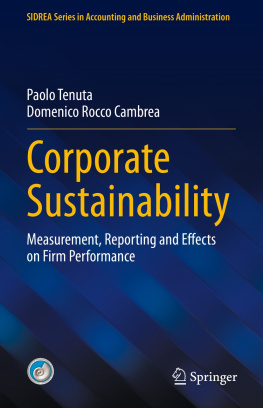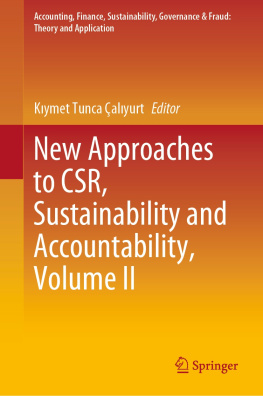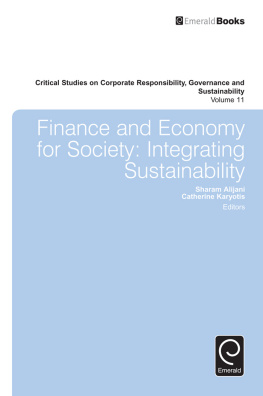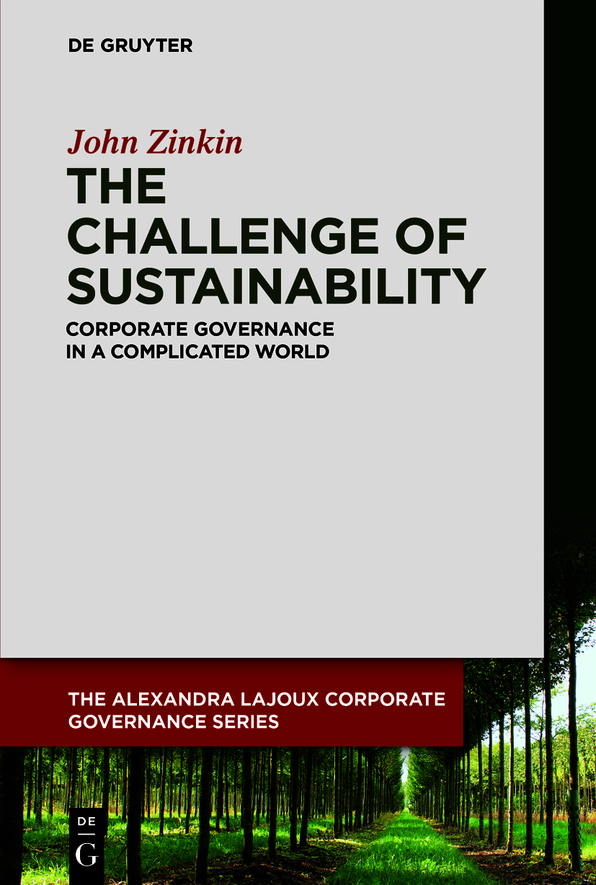The Alexandra Lajoux Corporate Governance Series
Edited by
Alexandra Reed Lajoux
ISBN 9783110670400
e-ISBN (PDF) 9783110670486
e-ISBN (EPUB) 9783110670608
Bibliographic information published by the Deutsche Nationalbibliothek
The Deutsche Nationalbibliothek lists this publication in the Deutsche Nationalbibliografie; detailed bibliographic data are available on the Internet at http://dnb.dnb.de.
2020 Walter de Gruyter GmbH, Berlin/Boston
Part 1: Expanding Corporate Governances Remit
I should begin by declaring that I am a committed capitalist and strong believer in democratic freedom, despite the flaws in both. The flaws that have surfaced in the last forty years in the capitalist system have created grievances in developed economies; grievances highlighted by populists of both the left and the right to their political advantage; but without providing effective solutions. This has created acrimony and division in public discourse, making necessary compromises on finding solutions to environmental, economic, employment and social sustainability more difficult.
I am not alone in believing that reforming the current capitalist system is necessary if these grievances are to be effectively dealt with and that failure to do so may lead to authoritarian governments of either the right or the left. However, I believe that reforming the system also requires changing corporate governance so that businesses can become part of the solution rather than being part of the problem.
Capitalisms focus between 1990 and 2008 moved gradually from maximizing only shareholder value to beginning to consider the needs of stakeholders, evidenced by the rise of corporate social responsibility (CSR) in the 1990s. The global financial crisis (GFC) of 2008 and the resulting economic and political dislocations that followed have in part led to re-evaluation of the role of capitalism in 21st century society.
Chapter 1 Corporate Governance An Evolving Idea in Challenging Times
This chapter is presented in three parts. The first describes corporate governances evolution over the past thirty years; the second introduces the challenge posed to corporate governance by the dissatisfaction with the current economic order and asks what more it needs to do to meet the challenges posed by populism; the third closes with a summary of the discussion.
Corporate Governance An Evolving Idea
Corporate Governance, or CG, is a relatively recent idea,1 though the principles on which it is based are as old as humanitys invention of organizations people coming together to achieve a common purpose. It has only existed since the early 1990s. Its original remit was very narrow focusing on legal and audit concerns of regulators and investors, as a result of the Polly Peck2 and Robert Maxwell3 corporate scandals in the UK.
The Purpose of CG
Originally CG was designed to achieve two things. The first was to provide a system of checks and balances to prevent CEOs and management from abusing the trust investors placed in them when they invested their money to build successful businesses. This was to deal with the so-called principal-agent problem where investors (principals) entrusted their money to managers (agents) in the hope they would build sustainable businesses with a good rate of return on their investments. The second was to create transparency through insisting on formal structure and process in board decision making, thereby allowing regulators and investors to understand why and how such decisions had been made in the event things went wrong.
This was a reaction to the behavior of managers during what Peter Drucker termed managerial capitalism from the late 1940s until the early 1970s. Investors came to realize management had their own agendas, abusing the trust placed in them in order to build their own empires, guaranteeing themselves status and job security at the expense of shareholders.4 By insisting on formal checks and balances on the authority of management through the use of audit committees, investors were able to tilt the balance of power back toward shareholders. However, the pendulum swung too far in favor of short-term satisfaction of shareholder needs, as a result of Milton Friedmans claim that the purpose of business was to maximize shareholder value.5
In reaction to the resulting excesses of shareholder capitalism with its focus on short-term profit maximization, there was a gradual recognition of the need to build into the system of checks and balances the idea that long-term value creation mattered. This became the third reason for CG: to help boards and management focus on long-term sustainability, as opposed to only maximizing short-term shareholder value. This led to a change in emphasis from shareholder capitalism, focusing almost uniquely on total shareholder returns (TSR) to stakeholder capitalism as the 21st century began.
The Transition Toward Stakeholder Capitalism
Seen from a purely legal perspective, shareholder primacy is defended because it is deemed capable of dealing with complexity, to be legally efficacious and efficient, though its supporters admit it may not be socially efficient, equitable, or ethical.6 In its purest form, it places severe constraints on what boards should consider, evidenced by the following judgments in the Delaware Chancery Court:
[A] clear-eyed look at the law of corporations in Delaware reveals that, within the limits of their discretion, directors must make stockholder welfare their sole end, and that other interests may be taken into consideration only as a means of promoting stockholder welfare.7
[Emphasis mine]
Having chosen a for-profit corporate form directors are bound by the fiduciary duties and standards that accompany that form. Those standards include acting to promote the value of the corporation for the benefit of the stockholders. The Inc. after the company name has to mean at least that. Thus, I cannot accept as valida corporate policy that specifically, clearly and admittedly seeks not to maximize the economic value of a for-profit Delaware corporation for the benefit of its stockholders8
[Emphasis mine]
The Delaware judgments are perhaps the most restrictive in terms of their focus on benefitting shareholders. There is a less restrictive perspective which makes the case that the law does not require shareholder value maximization to be achieved by ignoring externalities. Rather it is the belief within boards that this is what the law demands and the resulting incentives and management remuneration that drive corporations to focus excessively on short-term profitability:
While company law in some jurisdictions adheres to shareholder value (the legal concept, which we distinguish from the social norm of shareholder primacy), the underlying rationale for facilitating the corporate form through legislation is always that it is thought to be beneficial for society through its contribution to economic development. No company law system insists on boards focusing only on returns for shareholders. We see shareholder value jurisdictions, like the UK, expressly stipulating that broader societal concerns, including environmental protection, should be taken into account. Generally, company law across jurisdictions allows boards to integrate environmental and social externalities beyond legal compliance, at least as far as the business case argument goes.
However, boards generally do not opt for corporate sustainability within the realm of the business case, let alone challenge the outer boundaries of the scope to pursue profit in a sustainable manner by going beyond the business case.











